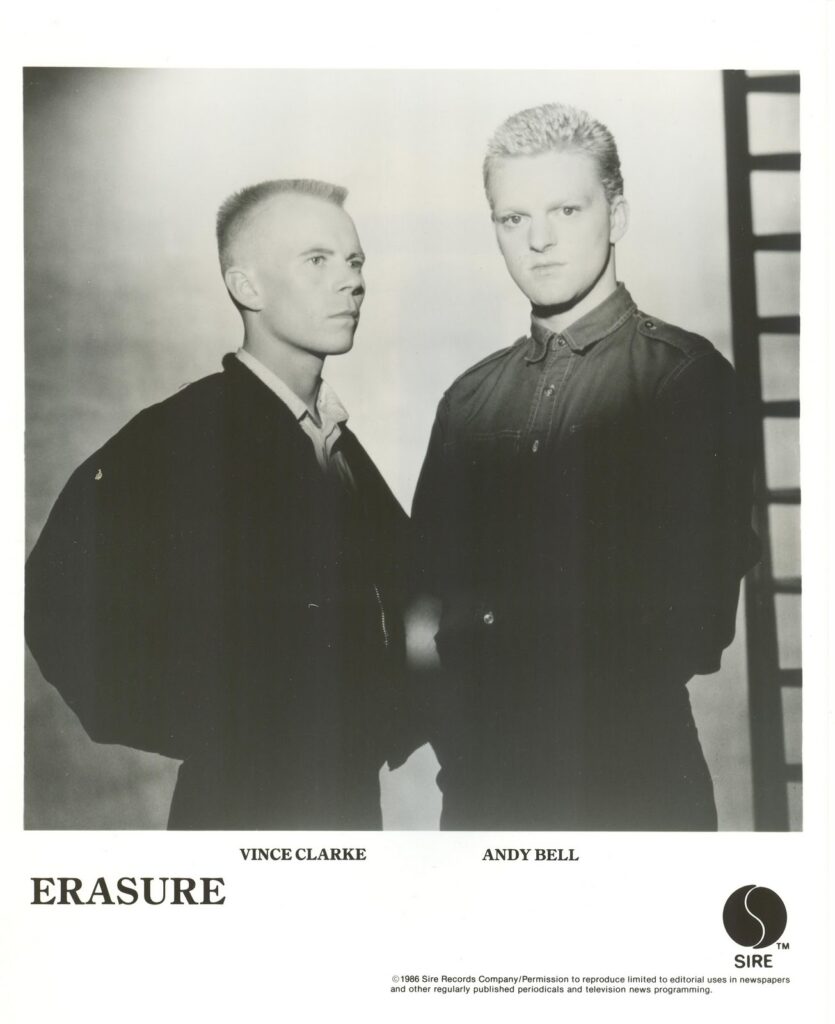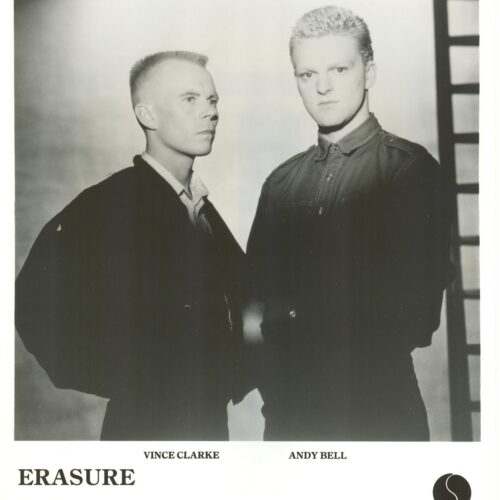It’s September 1985 and my 15-year-old self thinks he is on to something. I’m in John Menzies, a newsagent-cum-Woolworths wannabe and the only record stockist in Stretford’s Arndale Centre. A mile away from a Mancunian footballing mega-corporation, the Arndale is a shithole of bad shops and a honey-pot for bored teenagers and grizzly pensioners. But, I’m on a mission – to seek out a fabulous new song I’ve heard on the radio. It’s called ‘Who Needs Love Like That?’ by a band called Eurasia and I’m so ‘with it’ that it isn’t even in the charts yet.
Unfortunately, the single is so obscure that the bloke behind the counter cannot find it. “We’ve got nothing by a band with that name,” he tells me unapologetically. It’s weird, because he seems to have fingered his way through the ‘Y’ section of the racks of suburban chart fodder. “I think their name begins with ‘E’,” I suggest timidly. “Ah,” he says, the shilling dropping, “I thought you said they were called ‘Your Asia’ – sorry about that.” I stifle a smirk.
A couple of minutes later he’s back, empty-handed. “I couldn’t find anything by Eurasia – the nearest thing I’ve got is by some group called Erasure – what did you say the song was called again?” He doesn’t hide his smirk. However, the mystery was solved – I had found my new band. And, for me, never again would Erasure be shrouded in ambiguity. Erasure were out and proud – the de facto purveyors of straight-up, honest pop delivered by a front man who was entirely comfortable in his own skin.
When I get home and play their debut single, it perfectly represents Erasure’s 25-year career. From its quivering vocal intro – introducing Andy Bell as a suitably functional if technically challenged vocalist – and Vince Clarke’s Eastern-flecked synth line, ‘Who Needs Love Like That?’ sounds like a newborn pop hit, blinking and cooing in its first blast of airtime. It’s a good song – maybe not a great song – and immediately set out to define the DNA of Erasure. From the off, Erasure seemed to be about the creation of pop music – substance over any stylistic smokescreens. Their debut album Wonderland – released 25 years ago – was unflinching in what Erasure seemed to represent. They were a band to latch onto. Were Erasure cool in 1985? Probably not. Did it matter if they kept churning out songs like ‘Who Needs Love Like That?’ Not a jot.
When they met in 1985 Andy Bell and Vince Clarke had cosmically different musical pedigrees. That latter was a one-man hit machine. He couldn’t help himself – the first half of the 80s is virtually soundtracked by Clarke-penned synth-pop anthems. He wrote Depeche Mode’s first three singles, including the ‘ohrwurm’ breakthrough tracks ‘New Life’ and ‘Just Can’t Get Enough’, before decamping to form Yazoo and deliver yet more classic pop songs with Alison Moyet. When the pair split in 1983, Clarke formed The Assembly with Eric Radcliffe and scored yet another hit single with the Feargal Sharkey-fronted ‘Never Never’. But, The Assembly ultimately became a source of frustration for Clarke and he decided to start up a new project, placing an advert in Melody Maker inviting a singer to join him.
Peterborough-born Andy Bell had been a fan of Clarke’s work and in 1985 was working in a meat-packing factory. Legend has it that Bell was the 43rd singer that auditioned for Clarke and that although Bell impressed, the initial idea for Erasure would see Clarke working with a variety of singers on the debut album. It didn’t quite work out that way, and once ensconced, Bell’s boundless energy and blue-collar charisma sparked a chemistry that would see him and Clarke through 13 studio albums and upwards of 20 million sales.
Erasure’s chart life, however, took a while to ignite. The first three singles that preceded the release of Wonderland failed to break into the Top 40. There were, however, sparks of intrigue; the aforementioned ‘Who Needs Love Like That?’ is a hindsight-enhanced classic, while (the admittedly risible in every way) Dollar made a better commercial first of the sweet paean to unrequited love, ‘Oh L’amour’, turning into a sizeable hit in 1987. The original Erasure version was backed with ‘Gimme! Gimme! Gimme! (A Man After Midnight) – their first stab at covering ABBA.
This comparative lack of success – certainly by Clarke’s previous chart heroics – meant that Wonderland was released on 2nd June 1986 with little fanfare. The album was produced by Flood, who at that point in his pre-U2 career had not taken on sole production duties until he began to work with Clarke and Bell (although he had engineered tracks for New Order and Nick Cave And The Bad Seeds). The resultant album is dichotomous beast: aspects of Wonderland are deeply flawed – the record contains a couple of laughably bad songs – but somehow is a very easy album to love. The blemishes and clunky moments make Wonderland special. In an era of high-falutin’ imagery and trowled-on pretentiousness, Erasure’s honest transparency was particularly endearing.
Of the 11 tracks that make up the UK release of Wonderland, Bell and Clarke co-wrote eight and the album’s inconsistent quality points to the newly-formed collaboration flexing their collective muscles and working out boundaries. While there are a number of sparkling tunes – the excellent ‘Push Me Shove Me’ is the rallying cry to end an abusive relationship (“Now I know the game you play / I can see it in your eyes”) – Wonderland includes two or three stinkers. ‘Pistol’ is hilariously terrible; a camped-to-the-max police officer fetish anthem (“Blue boy go get your gun”), which was subsequently removed from the US version of the album.
But even a song as teeth-grindingly naff as ‘Pistol’ had a certain thrill – play it once and you’d probably be singing it for the rest of the day. And therein lay the magic of Erasure – a likeability factor that rode roughshod over cerebral critique. There was a sense that Wonderland showcased a band who were dedicated to the art of crafting pop music, and just happened to use synthesized sounds to make the music, as opposed to a synth band showing-off their technology via the medium of pop. It is a subtle difference, but one which – in this scribe’s opinion – became central to Erasure’s appeal.
Arguably, the foundation for the duo’s success is present on Wonderland. The Bell-penned ‘Cry So Easy’ is a sophisticated take on electro-pop and although ‘Senseless’ maybe sugar-coated it hints at lustful delights (“Inhibition’s slipping away / Stay there, got a lot we can share”). If ‘Reunion’ belly-flops under the weight of a fromage-drenched chorus, ‘Heavenly Action’ is another simpering moment of songwriting purity, with the duo’s chemistry and sense of playfulness shining through.
The other aspect of Erasure’s charm was Andy Bell himself. Wonderland presented a gay man who appeared utterly at ease with his sexuality. In the mid-80s, major pop bands either went to great lengths to hide their homosexuality (Wham! anyone?) or portrayed gay men as cartoon characters (step forward Culture Club and Frankie Goes To Hollywood). From day one, it was apparent – even to this slightly-naive teenager – that Andy Bell was a reassuringly normal gay man, who didn’t feel the need to wear women’s smocks or make videos based on Roman orgies. And, okay, Bell danced like your Dad and his voice got a bit wobbly on the high notes, but that only added to the warmth of Erasure.
However, the reaction to Wonderland was muted. Critics were initially unmoved and there was a sense that the album didn’t stack up to Clarke’s previous work. Some hacks felt that Andy Bell’s vocal style was desperately trying to imitate Alison Moyet – a pointless ploy if ever there was one and a pretty unfounded slice of journalistic bitchiness. Sales were not exactly of the hot cake variety; Wonderland stalled at number 71 in the UK album charts although it did crack the Top 20 in Germany.
But, if the majesty of Wonderland would prove to be a slow-burner, the events of October 1986 would demonstrate that the chemistry evoked on the debut was extremely close to producing classic pop. Only four months after the release of their debut album, Erasure released their fourth single, in the shape of a brand new song. ‘Sometimes’ felt like an instant, nailed-on classic. With its faux acoustic guitar and a lovelorn Bell musing that “The truth is harder / Than the pain inside” the song became Erasure’s first global hit. The Clarke-Bell songwriting partnership was learning fast. Erasure had lift-off.
They’d follow ‘Sometimes’ with a flurry of gold-plated singles including ‘It Doesn’t Have To Be’, ‘Chains Of Love’, ‘A Little Respect’ and ‘Stop!’ during a period which encompassed the career highs of 1987’s The Circus and the following year’s The Innocents album and Crackers International EP. These were heady times for – as the imminent release of their 14th studio album Tomorrow’s World confirms – one of Britain’s most enduring pop bands.
My 15-year-old self had been right – I was onto something that day in John Menzies.
The special edition reissue of Wonderland is out now



